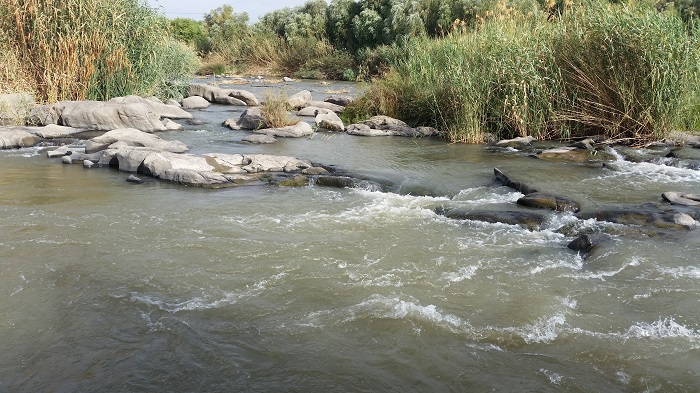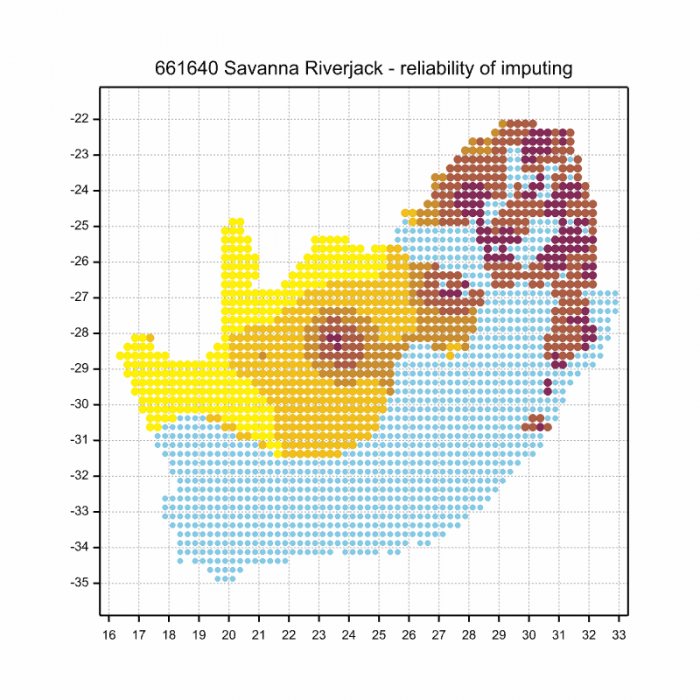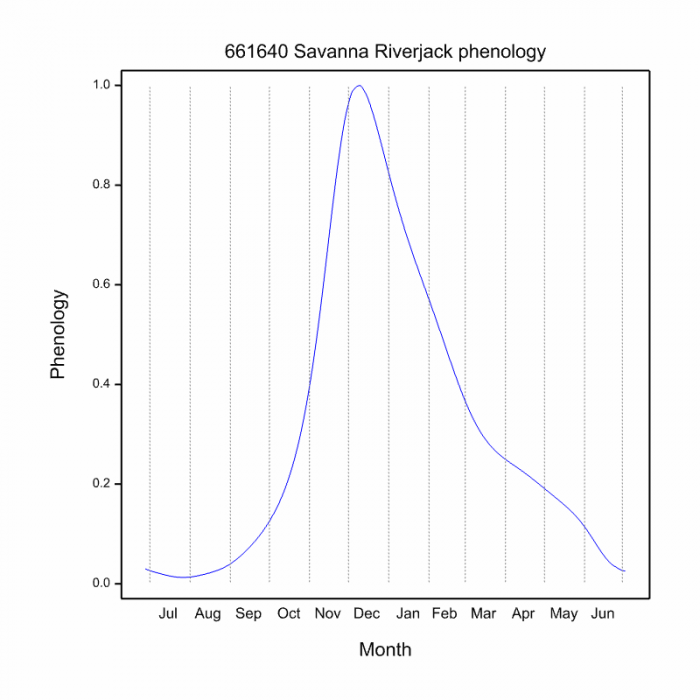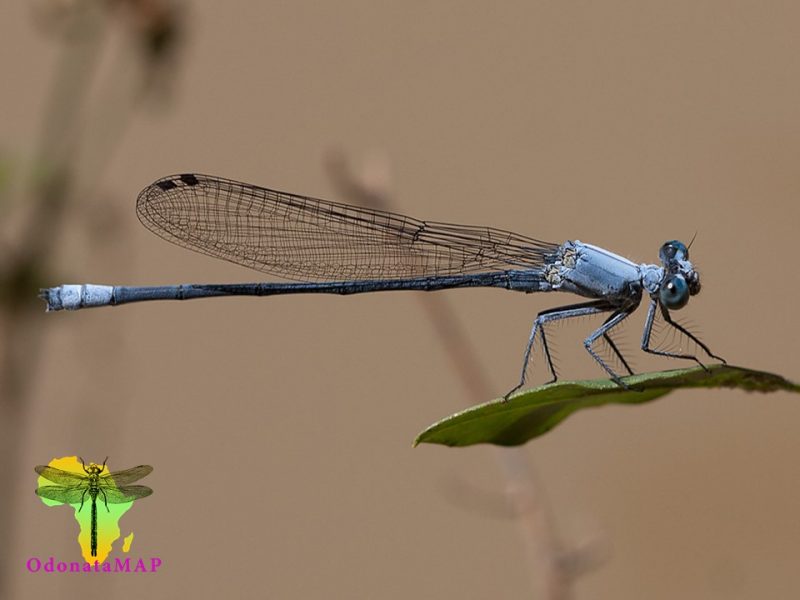Cover photo by Gregg Darling.
Find the Savanna Riverjack in the FBIS database (Freshwater Biodiversity Information System) here.
Family Platycnemididae
Identification

Mkuze River, KwaZulu-Natal
Photo by Ryan Tippett
Medium sized
Length up to 44mm; Wingspan attains 62mm.
The Savanna Riverjack is robust for a damselfly, with a distinctive shape and posture. Males are easily recognised as there are no similar looking species in Southern Africa. Adult males are covered in pale blue-white pruinosity and are rather eyecatching.
Females resemble those of Metacnemis valida (Blue Riverjack). The two are similar in size and shape and both are predominantly brown with darker markings. Metacnemis valida females have a prominent white diagonal band on the sides of the thorax. This is absent in Mesocnemis singularis. Additionally the two species are not known to co-occur.
Click here for more details on identification.

Mkuze River, KwaZulu-Natal
Photo by Ryan Tippett
Habitat
The natural habitat of the Savanna Riverjack includes open, rocky rivers and streams in savanna, scrub, or forest areas. The Savanna Riverjack is sometimes also found along the rocky shores of lakes. Mesocnemis singularis prefers fast-flowing water, including broken and white water with nearby vegetation to perch on.

Behaviour
The Savanna Riverjack perches conspicuously near the water on rocks and overhanging or emergent twigs and stems. They often perch close to white water and both sexes are frequently found together.

Orange River, near Upington, Northern Cape
Photo by Ryan Tippett
It is most active from October to May, but is likely to fly all year round at some warmer sites (See Phenology below).
Status and Conservation
The Savanna Riverjack is a common species. It is listed as of Least Concern in the IUCN Red List of Threatened Species. The Savanna Riverjack is a fairly hardy species but is most numerous at healthy, undisturbed rivers.

Amakhosi Game Reserve, KwaZulu-Natal
Photo by Ryan Tippett
Distribution
The Savanna Riverjack is widespread in sub-Saharan Africa, including west, central, eastern, and southern Africa. In South Africa, the Savanna Riverjack is found mainly in the north and east, in Limpopo, Gauteng, Mpumalanga, and KwaZulu-Natal. It is also found along the length of the Vaal and Orange Rivers, and some of their larger tributaries.
Below is a map showing the distribution of records for Savanna Riverjack in the OdonataMAP database as at February 2020.

Below is a map showing the distribution of records for Savanna Riverjack in the OdonataMAP database as of December 2024.

The next map below is an imputed map, produced by an interpolation algorithm, which attempts to generate a full distribution map from the partial information in the map above. This map will be improved by the submission of records to the OdonataMAP section of the Virtual Museum.


Ultimately, we will produce a series of maps for all the odonata species in the region. The current algorithm is a new algorithm. The objective is mainly to produce “smoothed” maps that could go into a field guide for odonata. This basic version of the algorithm (as mapped above) does not make use of “explanatory variables” (e.g. altitude, terrain roughness, presence of freshwater — we will be producing maps that take these variables into account soon). Currently, it only makes use of the OdonataMAP records for the species being mapped, as well as all the other records of all other species. The basic maps are “optimistic” and will generally show ranges to be larger than what they probably are.
These maps use the data in the OdonataMAP section of the Virtual Museum, and also the database assembled by the previous JRS funded project, which was led by Professor Michael Samways and Dr KD Dijkstra.
Phenology



Mkuze River, KwaZulu-Natal
Photo by Ryan Tippett
Further Resources
The use of photographs by Alan Manson is acknowledged. All other photographs by Ryan Tippett.
Savanna Riverjack Mesocnemis singularis Karsch, 1891
Other common names: Riverjack; Common Riverjack (Alternative English Name); Vlakterivierjuffer (Afrikaans)
Recommended citation format: Loftie-Eaton M; Navarro R; Tippett RM; Underhill L. 2025. Savanna Riverjack Mesocnemis singularis. Biodiversity and Development Institute. Available online at https://thebdi.org/2020/02/25/savanna-riverjack-mesocnemis-singularis/
References: Tarboton, M; Tarboton, W. (2019). A Guide to the Dragonflies & Damselflies of South Africa. Struik Nature.
Samways, MJ. (2008). Dragonflies and Damselflies of South Africa. Pensoft
Samways, MJ. (2016). Manual of Freshwater Assessment for South Africa: Dragonfly Biotic Index. Suricata 2. South African National Biodiversity Institute, Pretoria
Martens, A; Suhling, F. (2007). Dragonflies and Damselflies of Namibia. Gamsberg Macmillan.

Orange River, near Prieska, Northern Cape
Photo by Ryan Tippett

